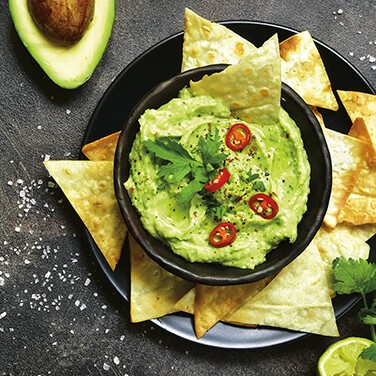We Know the Guac Is Extra, But Is It Safe?
By Kylie Wolfe
Outbreaks linked to fresh produce items have sparked research efforts by the FDA, which reported that contaminated herbs led to 2,699 cases of illness and 84 hospitalizations from 1996 to 2015. It was also noted that 525 cases of illness and 23 hospitalizations between 2005 and 2015 were caused by pathogenic bacteria specifically found in avocado products.
The FDA recently began an 18-month project to test for microbial contaminants in common produce items. The project includes two separate assignments: one assessing the amount of pathogens found on fresh herbs, including cilantro, parsley, and basil, and the other measuring bacteria found in avocado and avocado products. The study will include 1,600 samples collected from both domestic and imported products.
Don’t Pass the Parsley
Samples collected since January 1, 2018, have already provided some evidence of disease-causing microbes. While none of the 35 domestic herb samples were contaminated, four of the 104 imported samples did test positive for Salmonella sp., and three showed Shiga toxin-producing Escherischia coli. Three of the 58 domestic avocado and guacamole samples collected tested positive for Listeria monocytogenes, as did one of the 49 imported samples.
According to Craig Hedberg, food safety expert at the University of Minnesota, the presence of these bacteria is “an indication that companies need to pay more attention to sanitation in their plants.”
Contamination Concerns
Since fresh herbs are only a small component in recipes, people can rarely pinpoint them as the cause of food-related illness. While washing produce can help decrease any bacteria present, it won’t remove it completely. A “kill step” like cooking can reduce or even eliminate these contaminants, but many herbs aren’t heated before they’re consumed.
In contrast, avocados are often a main ingredient that provides a high-moisture, non-acidic environment perfectly suited to support the growth of bacteria. The avocado samples containing Listeria also demonstrated the potential for bacterial growth during refrigeration, an additional concern. The FDA has not released details about the amount of bacteria found in the contaminated samples, but that will ultimately determine the severity of the situation.
Future Findings
The FDA is still collecting data, but they plan to release their results quarterly in addition to a comprehensive report at the end of the study. No conclusions can be made about the above-mentioned results until all data is collected.
Depending on their findings, the FDA may pursue additional regulations to further protect the public from contaminated products. Currently, contaminated imported produce items are denied entry to the United States, and domestic produce is voluntarily recalled.
